Entrepreneurship and Small Business Management: Ventures and Skills
VerifiedAdded on 2023/01/19
|13
|4126
|64
Report
AI Summary
This report provides a comprehensive analysis of entrepreneurship and small business management, focusing on various types of entrepreneurial ventures, their impact on the economy, and the essential skills and traits of successful entrepreneurs. It discusses small ventures, large ventures, social ventures, public ventures, and private ventures, highlighting their purposes and examples. The report also examines the role of micro and small businesses in boosting exports, generating employment, and fostering independence in the social economy. Furthermore, it differentiates successful entrepreneurs from other business managers by outlining characteristic traits and skills, such as risk-taking, innovation, and leadership. The study concludes by emphasizing the importance of background and experience in fostering entrepreneurship, contributing to a detailed understanding of the entrepreneurial landscape. Desklib offers a wide range of past papers and solved assignments to aid students in their studies.

ENTREPRENEURSHIP
AND SMALL BUSINESS
MANAGEMENT
AND SMALL BUSINESS
MANAGEMENT
Paraphrase This Document
Need a fresh take? Get an instant paraphrase of this document with our AI Paraphraser
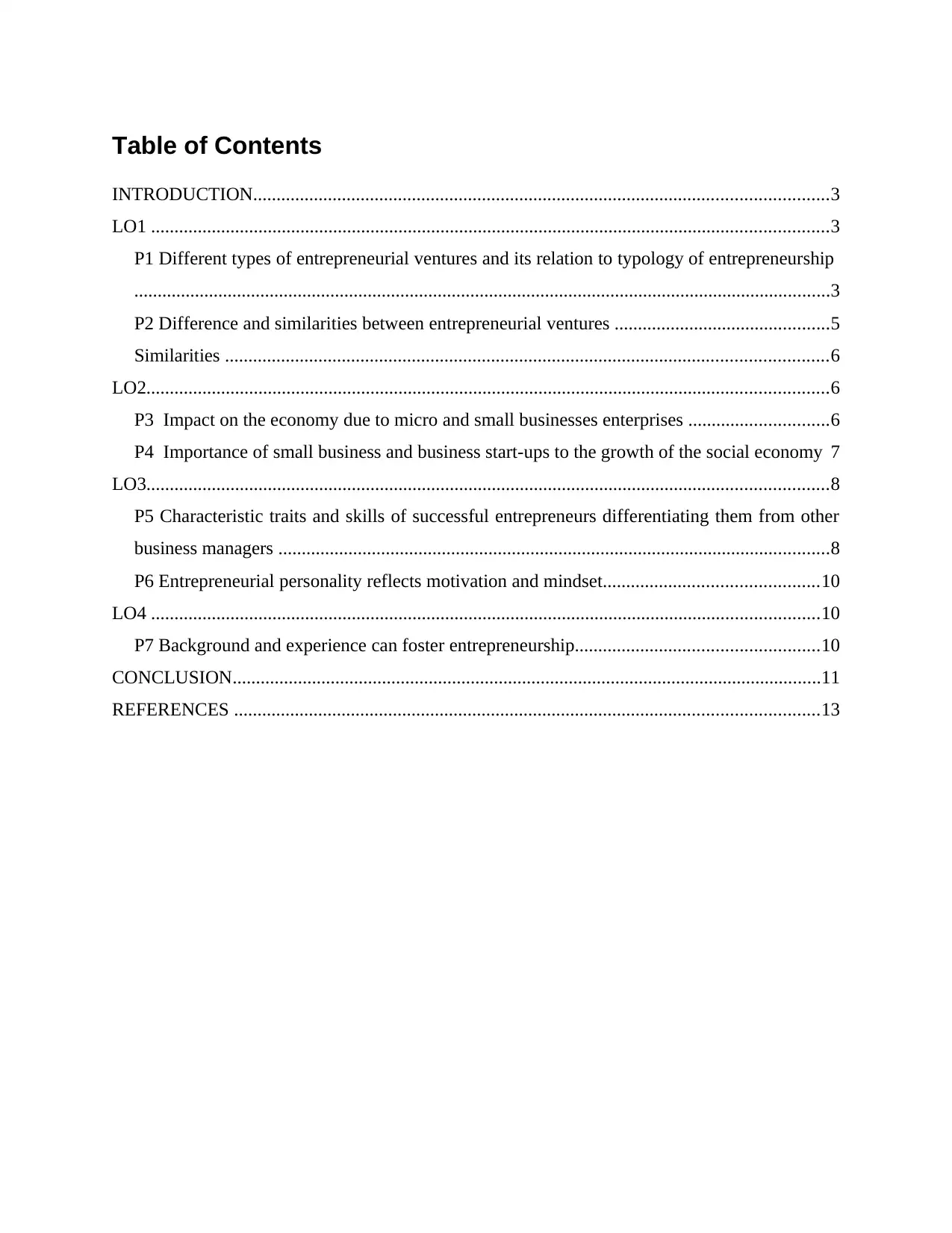
Table of Contents
INTRODUCTION...........................................................................................................................3
LO1 .................................................................................................................................................3
P1 Different types of entrepreneurial ventures and its relation to typology of entrepreneurship
.....................................................................................................................................................3
P2 Difference and similarities between entrepreneurial ventures ..............................................5
Similarities .................................................................................................................................6
LO2..................................................................................................................................................6
P3 Impact on the economy due to micro and small businesses enterprises ..............................6
P4 Importance of small business and business start-ups to the growth of the social economy 7
LO3..................................................................................................................................................8
P5 Characteristic traits and skills of successful entrepreneurs differentiating them from other
business managers ......................................................................................................................8
P6 Entrepreneurial personality reflects motivation and mindset..............................................10
LO4 ...............................................................................................................................................10
P7 Background and experience can foster entrepreneurship....................................................10
CONCLUSION..............................................................................................................................11
REFERENCES .............................................................................................................................13
INTRODUCTION...........................................................................................................................3
LO1 .................................................................................................................................................3
P1 Different types of entrepreneurial ventures and its relation to typology of entrepreneurship
.....................................................................................................................................................3
P2 Difference and similarities between entrepreneurial ventures ..............................................5
Similarities .................................................................................................................................6
LO2..................................................................................................................................................6
P3 Impact on the economy due to micro and small businesses enterprises ..............................6
P4 Importance of small business and business start-ups to the growth of the social economy 7
LO3..................................................................................................................................................8
P5 Characteristic traits and skills of successful entrepreneurs differentiating them from other
business managers ......................................................................................................................8
P6 Entrepreneurial personality reflects motivation and mindset..............................................10
LO4 ...............................................................................................................................................10
P7 Background and experience can foster entrepreneurship....................................................10
CONCLUSION..............................................................................................................................11
REFERENCES .............................................................................................................................13
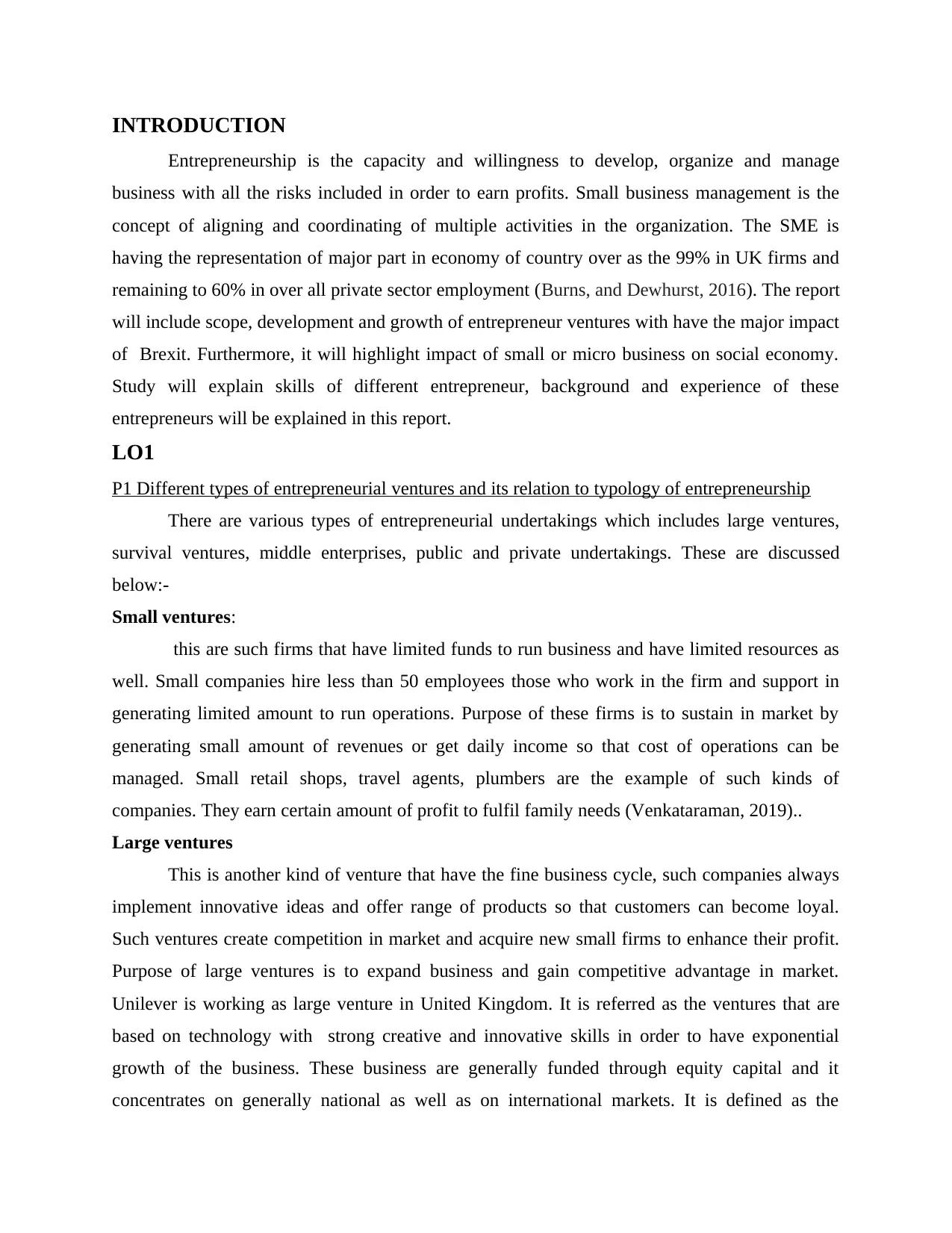
INTRODUCTION
Entrepreneurship is the capacity and willingness to develop, organize and manage
business with all the risks included in order to earn profits. Small business management is the
concept of aligning and coordinating of multiple activities in the organization. The SME is
having the representation of major part in economy of country over as the 99% in UK firms and
remaining to 60% in over all private sector employment (Burns, and Dewhurst, 2016). The report
will include scope, development and growth of entrepreneur ventures with have the major impact
of Brexit. Furthermore, it will highlight impact of small or micro business on social economy.
Study will explain skills of different entrepreneur, background and experience of these
entrepreneurs will be explained in this report.
LO1
P1 Different types of entrepreneurial ventures and its relation to typology of entrepreneurship
There are various types of entrepreneurial undertakings which includes large ventures,
survival ventures, middle enterprises, public and private undertakings. These are discussed
below:-
Small ventures:
this are such firms that have limited funds to run business and have limited resources as
well. Small companies hire less than 50 employees those who work in the firm and support in
generating limited amount to run operations. Purpose of these firms is to sustain in market by
generating small amount of revenues or get daily income so that cost of operations can be
managed. Small retail shops, travel agents, plumbers are the example of such kinds of
companies. They earn certain amount of profit to fulfil family needs (Venkataraman, 2019)..
Large ventures
This is another kind of venture that have the fine business cycle, such companies always
implement innovative ideas and offer range of products so that customers can become loyal.
Such ventures create competition in market and acquire new small firms to enhance their profit.
Purpose of large ventures is to expand business and gain competitive advantage in market.
Unilever is working as large venture in United Kingdom. It is referred as the ventures that are
based on technology with strong creative and innovative skills in order to have exponential
growth of the business. These business are generally funded through equity capital and it
concentrates on generally national as well as on international markets. It is defined as the
Entrepreneurship is the capacity and willingness to develop, organize and manage
business with all the risks included in order to earn profits. Small business management is the
concept of aligning and coordinating of multiple activities in the organization. The SME is
having the representation of major part in economy of country over as the 99% in UK firms and
remaining to 60% in over all private sector employment (Burns, and Dewhurst, 2016). The report
will include scope, development and growth of entrepreneur ventures with have the major impact
of Brexit. Furthermore, it will highlight impact of small or micro business on social economy.
Study will explain skills of different entrepreneur, background and experience of these
entrepreneurs will be explained in this report.
LO1
P1 Different types of entrepreneurial ventures and its relation to typology of entrepreneurship
There are various types of entrepreneurial undertakings which includes large ventures,
survival ventures, middle enterprises, public and private undertakings. These are discussed
below:-
Small ventures:
this are such firms that have limited funds to run business and have limited resources as
well. Small companies hire less than 50 employees those who work in the firm and support in
generating limited amount to run operations. Purpose of these firms is to sustain in market by
generating small amount of revenues or get daily income so that cost of operations can be
managed. Small retail shops, travel agents, plumbers are the example of such kinds of
companies. They earn certain amount of profit to fulfil family needs (Venkataraman, 2019)..
Large ventures
This is another kind of venture that have the fine business cycle, such companies always
implement innovative ideas and offer range of products so that customers can become loyal.
Such ventures create competition in market and acquire new small firms to enhance their profit.
Purpose of large ventures is to expand business and gain competitive advantage in market.
Unilever is working as large venture in United Kingdom. It is referred as the ventures that are
based on technology with strong creative and innovative skills in order to have exponential
growth of the business. These business are generally funded through equity capital and it
concentrates on generally national as well as on international markets. It is defined as the
⊘ This is a preview!⊘
Do you want full access?
Subscribe today to unlock all pages.

Trusted by 1+ million students worldwide
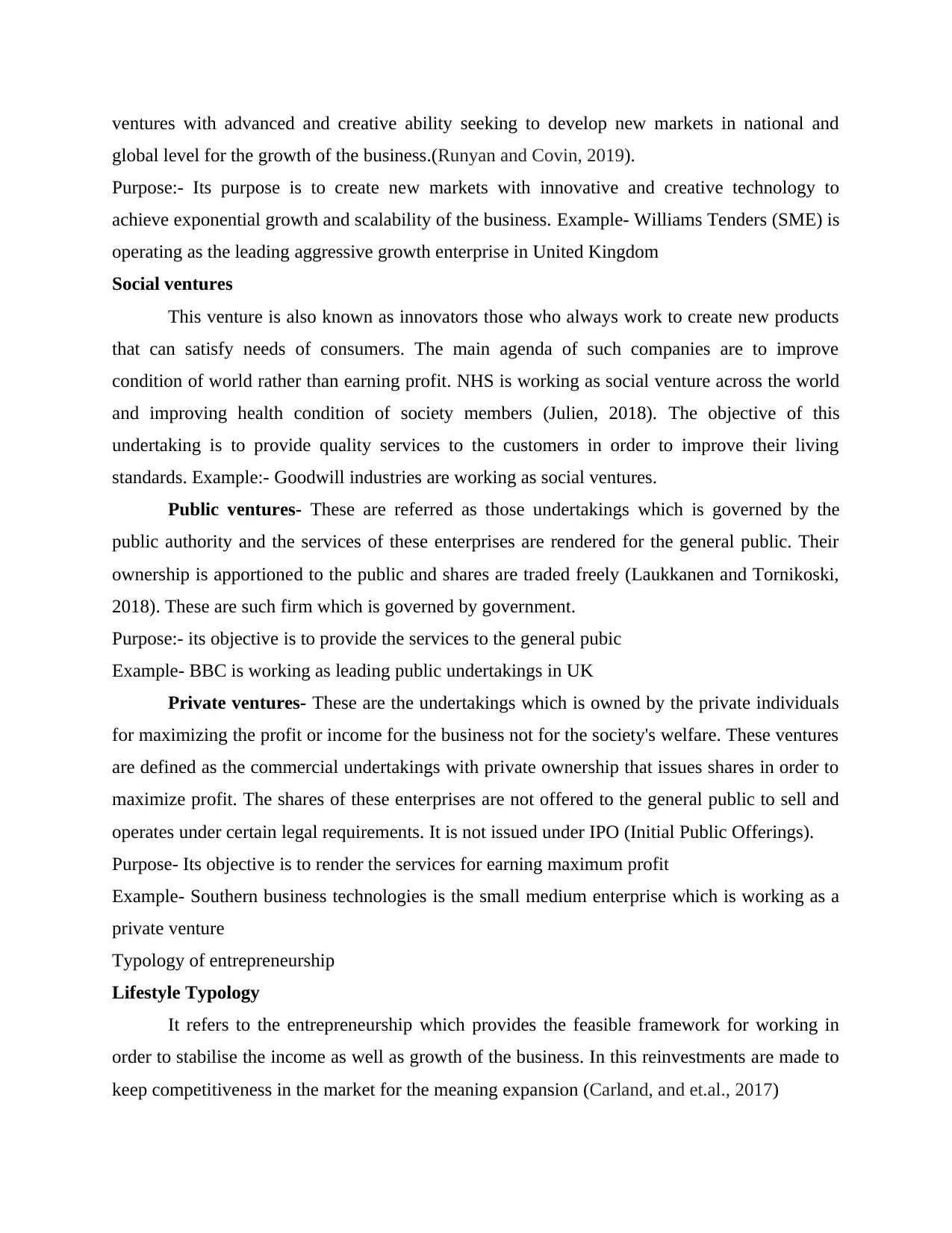
ventures with advanced and creative ability seeking to develop new markets in national and
global level for the growth of the business.(Runyan and Covin, 2019).
Purpose:- Its purpose is to create new markets with innovative and creative technology to
achieve exponential growth and scalability of the business. Example- Williams Tenders (SME) is
operating as the leading aggressive growth enterprise in United Kingdom
Social ventures
This venture is also known as innovators those who always work to create new products
that can satisfy needs of consumers. The main agenda of such companies are to improve
condition of world rather than earning profit. NHS is working as social venture across the world
and improving health condition of society members (Julien, 2018). The objective of this
undertaking is to provide quality services to the customers in order to improve their living
standards. Example:- Goodwill industries are working as social ventures.
Public ventures- These are referred as those undertakings which is governed by the
public authority and the services of these enterprises are rendered for the general public. Their
ownership is apportioned to the public and shares are traded freely (Laukkanen and Tornikoski,
2018). These are such firm which is governed by government.
Purpose:- its objective is to provide the services to the general pubic
Example- BBC is working as leading public undertakings in UK
Private ventures- These are the undertakings which is owned by the private individuals
for maximizing the profit or income for the business not for the society's welfare. These ventures
are defined as the commercial undertakings with private ownership that issues shares in order to
maximize profit. The shares of these enterprises are not offered to the general public to sell and
operates under certain legal requirements. It is not issued under IPO (Initial Public Offerings).
Purpose- Its objective is to render the services for earning maximum profit
Example- Southern business technologies is the small medium enterprise which is working as a
private venture
Typology of entrepreneurship
Lifestyle Typology
It refers to the entrepreneurship which provides the feasible framework for working in
order to stabilise the income as well as growth of the business. In this reinvestments are made to
keep competitiveness in the market for the meaning expansion (Carland, and et.al., 2017)
global level for the growth of the business.(Runyan and Covin, 2019).
Purpose:- Its purpose is to create new markets with innovative and creative technology to
achieve exponential growth and scalability of the business. Example- Williams Tenders (SME) is
operating as the leading aggressive growth enterprise in United Kingdom
Social ventures
This venture is also known as innovators those who always work to create new products
that can satisfy needs of consumers. The main agenda of such companies are to improve
condition of world rather than earning profit. NHS is working as social venture across the world
and improving health condition of society members (Julien, 2018). The objective of this
undertaking is to provide quality services to the customers in order to improve their living
standards. Example:- Goodwill industries are working as social ventures.
Public ventures- These are referred as those undertakings which is governed by the
public authority and the services of these enterprises are rendered for the general public. Their
ownership is apportioned to the public and shares are traded freely (Laukkanen and Tornikoski,
2018). These are such firm which is governed by government.
Purpose:- its objective is to provide the services to the general pubic
Example- BBC is working as leading public undertakings in UK
Private ventures- These are the undertakings which is owned by the private individuals
for maximizing the profit or income for the business not for the society's welfare. These ventures
are defined as the commercial undertakings with private ownership that issues shares in order to
maximize profit. The shares of these enterprises are not offered to the general public to sell and
operates under certain legal requirements. It is not issued under IPO (Initial Public Offerings).
Purpose- Its objective is to render the services for earning maximum profit
Example- Southern business technologies is the small medium enterprise which is working as a
private venture
Typology of entrepreneurship
Lifestyle Typology
It refers to the entrepreneurship which provides the feasible framework for working in
order to stabilise the income as well as growth of the business. In this reinvestments are made to
keep competitiveness in the market for the meaning expansion (Carland, and et.al., 2017)
Paraphrase This Document
Need a fresh take? Get an instant paraphrase of this document with our AI Paraphraser
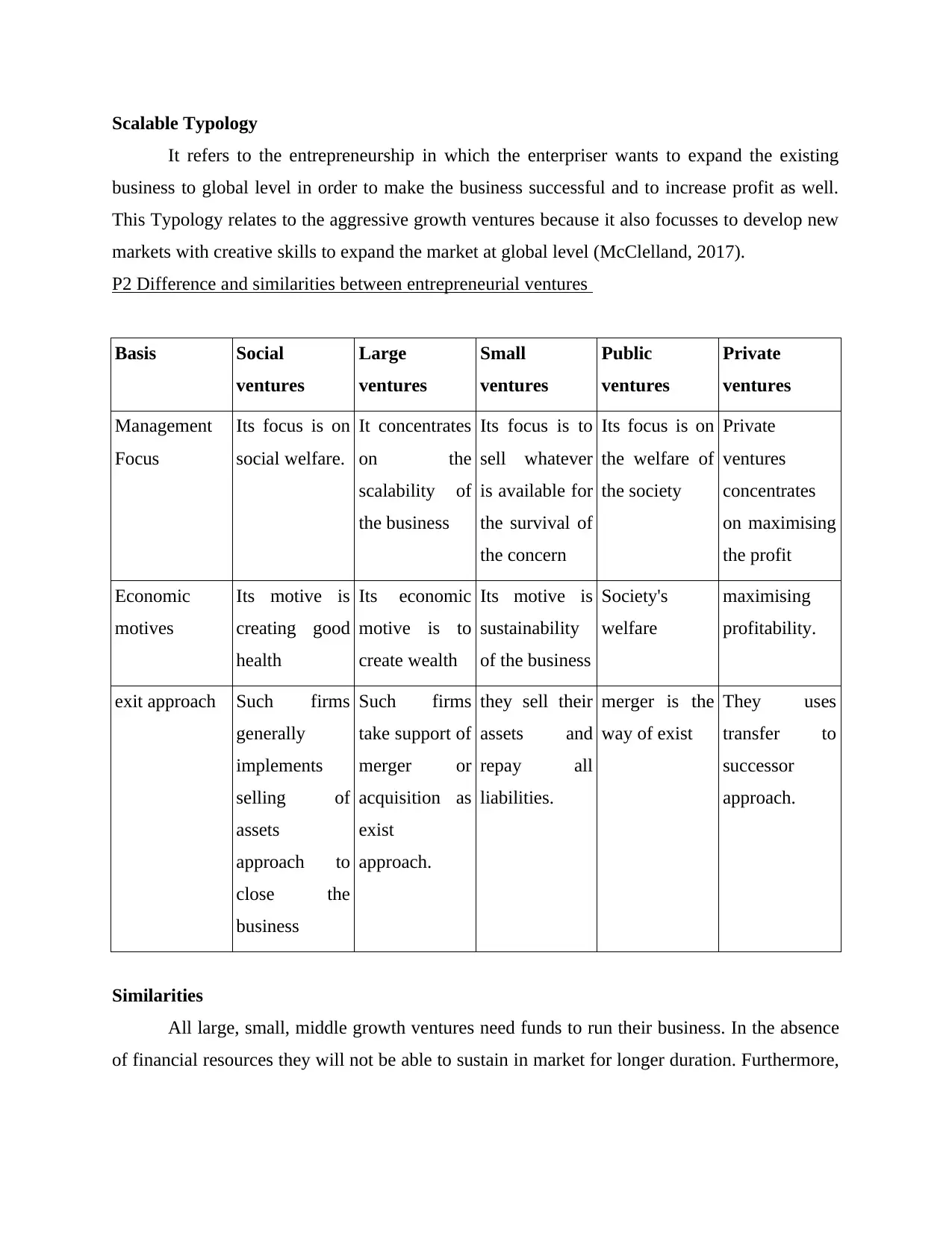
Scalable Typology
It refers to the entrepreneurship in which the enterpriser wants to expand the existing
business to global level in order to make the business successful and to increase profit as well.
This Typology relates to the aggressive growth ventures because it also focusses to develop new
markets with creative skills to expand the market at global level (McClelland, 2017).
P2 Difference and similarities between entrepreneurial ventures
Basis Social
ventures
Large
ventures
Small
ventures
Public
ventures
Private
ventures
Management
Focus
Its focus is on
social welfare.
It concentrates
on the
scalability of
the business
Its focus is to
sell whatever
is available for
the survival of
the concern
Its focus is on
the welfare of
the society
Private
ventures
concentrates
on maximising
the profit
Economic
motives
Its motive is
creating good
health
Its economic
motive is to
create wealth
Its motive is
sustainability
of the business
Society's
welfare
maximising
profitability.
exit approach Such firms
generally
implements
selling of
assets
approach to
close the
business
Such firms
take support of
merger or
acquisition as
exist
approach.
they sell their
assets and
repay all
liabilities.
merger is the
way of exist
They uses
transfer to
successor
approach.
Similarities
All large, small, middle growth ventures need funds to run their business. In the absence
of financial resources they will not be able to sustain in market for longer duration. Furthermore,
It refers to the entrepreneurship in which the enterpriser wants to expand the existing
business to global level in order to make the business successful and to increase profit as well.
This Typology relates to the aggressive growth ventures because it also focusses to develop new
markets with creative skills to expand the market at global level (McClelland, 2017).
P2 Difference and similarities between entrepreneurial ventures
Basis Social
ventures
Large
ventures
Small
ventures
Public
ventures
Private
ventures
Management
Focus
Its focus is on
social welfare.
It concentrates
on the
scalability of
the business
Its focus is to
sell whatever
is available for
the survival of
the concern
Its focus is on
the welfare of
the society
Private
ventures
concentrates
on maximising
the profit
Economic
motives
Its motive is
creating good
health
Its economic
motive is to
create wealth
Its motive is
sustainability
of the business
Society's
welfare
maximising
profitability.
exit approach Such firms
generally
implements
selling of
assets
approach to
close the
business
Such firms
take support of
merger or
acquisition as
exist
approach.
they sell their
assets and
repay all
liabilities.
merger is the
way of exist
They uses
transfer to
successor
approach.
Similarities
All large, small, middle growth ventures need funds to run their business. In the absence
of financial resources they will not be able to sustain in market for longer duration. Furthermore,
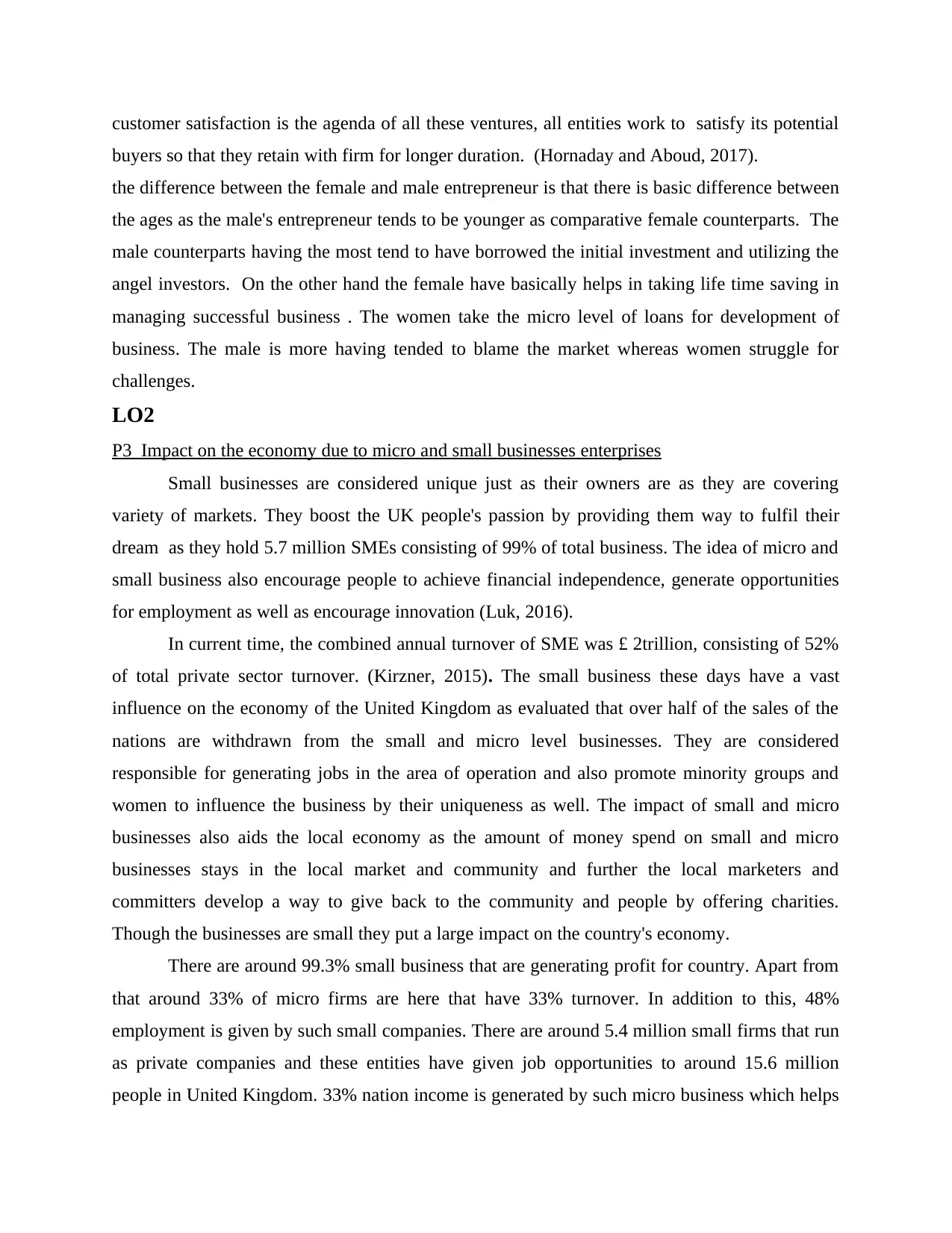
customer satisfaction is the agenda of all these ventures, all entities work to satisfy its potential
buyers so that they retain with firm for longer duration. (Hornaday and Aboud, 2017).
the difference between the female and male entrepreneur is that there is basic difference between
the ages as the male's entrepreneur tends to be younger as comparative female counterparts. The
male counterparts having the most tend to have borrowed the initial investment and utilizing the
angel investors. On the other hand the female have basically helps in taking life time saving in
managing successful business . The women take the micro level of loans for development of
business. The male is more having tended to blame the market whereas women struggle for
challenges.
LO2
P3 Impact on the economy due to micro and small businesses enterprises
Small businesses are considered unique just as their owners are as they are covering
variety of markets. They boost the UK people's passion by providing them way to fulfil their
dream as they hold 5.7 million SMEs consisting of 99% of total business. The idea of micro and
small business also encourage people to achieve financial independence, generate opportunities
for employment as well as encourage innovation (Luk, 2016).
In current time, the combined annual turnover of SME was £ 2trillion, consisting of 52%
of total private sector turnover. (Kirzner, 2015). The small business these days have a vast
influence on the economy of the United Kingdom as evaluated that over half of the sales of the
nations are withdrawn from the small and micro level businesses. They are considered
responsible for generating jobs in the area of operation and also promote minority groups and
women to influence the business by their uniqueness as well. The impact of small and micro
businesses also aids the local economy as the amount of money spend on small and micro
businesses stays in the local market and community and further the local marketers and
committers develop a way to give back to the community and people by offering charities.
Though the businesses are small they put a large impact on the country's economy.
There are around 99.3% small business that are generating profit for country. Apart from
that around 33% of micro firms are here that have 33% turnover. In addition to this, 48%
employment is given by such small companies. There are around 5.4 million small firms that run
as private companies and these entities have given job opportunities to around 15.6 million
people in United Kingdom. 33% nation income is generated by such micro business which helps
buyers so that they retain with firm for longer duration. (Hornaday and Aboud, 2017).
the difference between the female and male entrepreneur is that there is basic difference between
the ages as the male's entrepreneur tends to be younger as comparative female counterparts. The
male counterparts having the most tend to have borrowed the initial investment and utilizing the
angel investors. On the other hand the female have basically helps in taking life time saving in
managing successful business . The women take the micro level of loans for development of
business. The male is more having tended to blame the market whereas women struggle for
challenges.
LO2
P3 Impact on the economy due to micro and small businesses enterprises
Small businesses are considered unique just as their owners are as they are covering
variety of markets. They boost the UK people's passion by providing them way to fulfil their
dream as they hold 5.7 million SMEs consisting of 99% of total business. The idea of micro and
small business also encourage people to achieve financial independence, generate opportunities
for employment as well as encourage innovation (Luk, 2016).
In current time, the combined annual turnover of SME was £ 2trillion, consisting of 52%
of total private sector turnover. (Kirzner, 2015). The small business these days have a vast
influence on the economy of the United Kingdom as evaluated that over half of the sales of the
nations are withdrawn from the small and micro level businesses. They are considered
responsible for generating jobs in the area of operation and also promote minority groups and
women to influence the business by their uniqueness as well. The impact of small and micro
businesses also aids the local economy as the amount of money spend on small and micro
businesses stays in the local market and community and further the local marketers and
committers develop a way to give back to the community and people by offering charities.
Though the businesses are small they put a large impact on the country's economy.
There are around 99.3% small business that are generating profit for country. Apart from
that around 33% of micro firms are here that have 33% turnover. In addition to this, 48%
employment is given by such small companies. There are around 5.4 million small firms that run
as private companies and these entities have given job opportunities to around 15.6 million
people in United Kingdom. 33% nation income is generated by such micro business which helps
⊘ This is a preview!⊘
Do you want full access?
Subscribe today to unlock all pages.

Trusted by 1+ million students worldwide
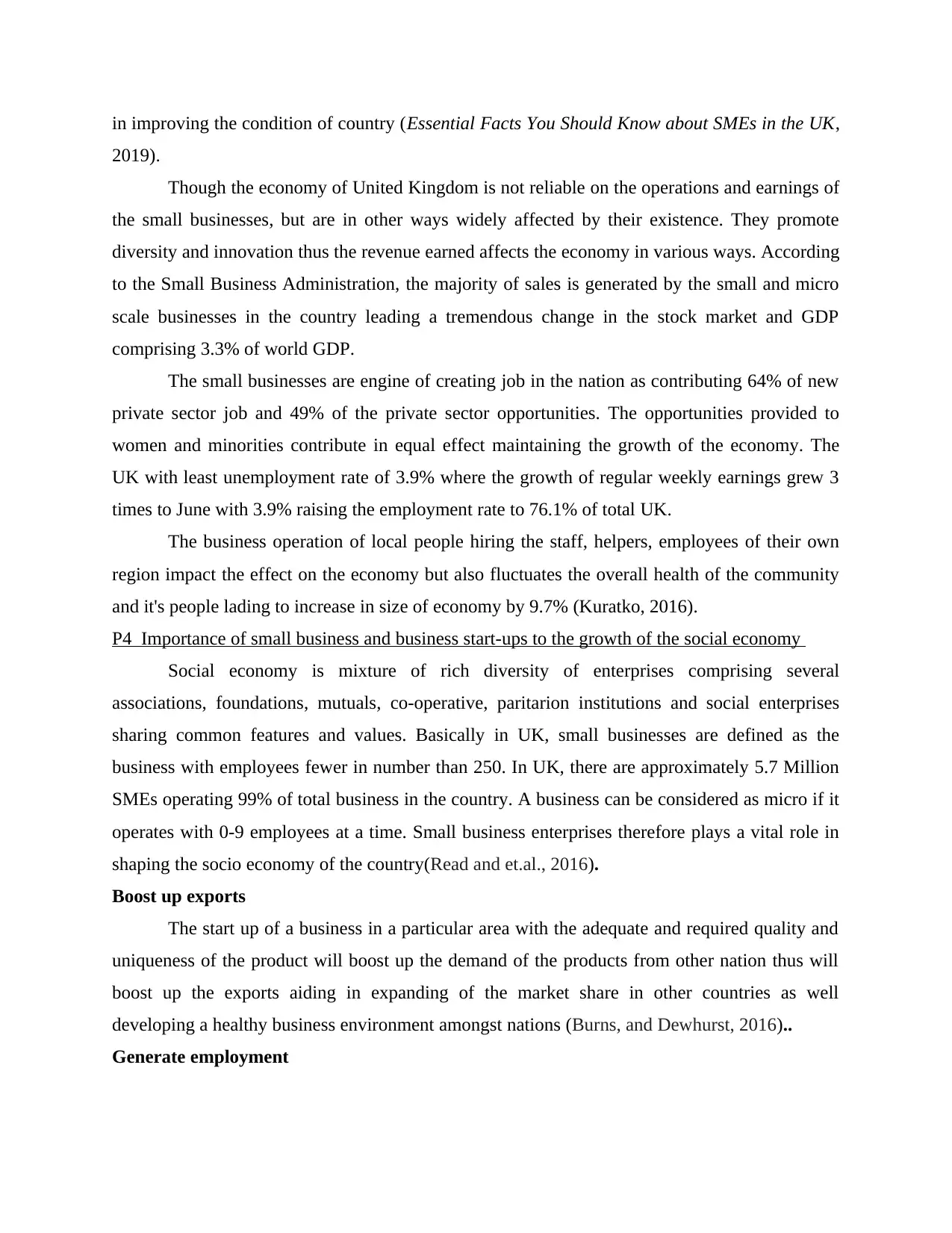
in improving the condition of country (Essential Facts You Should Know about SMEs in the UK,
2019).
Though the economy of United Kingdom is not reliable on the operations and earnings of
the small businesses, but are in other ways widely affected by their existence. They promote
diversity and innovation thus the revenue earned affects the economy in various ways. According
to the Small Business Administration, the majority of sales is generated by the small and micro
scale businesses in the country leading a tremendous change in the stock market and GDP
comprising 3.3% of world GDP.
The small businesses are engine of creating job in the nation as contributing 64% of new
private sector job and 49% of the private sector opportunities. The opportunities provided to
women and minorities contribute in equal effect maintaining the growth of the economy. The
UK with least unemployment rate of 3.9% where the growth of regular weekly earnings grew 3
times to June with 3.9% raising the employment rate to 76.1% of total UK.
The business operation of local people hiring the staff, helpers, employees of their own
region impact the effect on the economy but also fluctuates the overall health of the community
and it's people lading to increase in size of economy by 9.7% (Kuratko, 2016).
P4 Importance of small business and business start-ups to the growth of the social economy
Social economy is mixture of rich diversity of enterprises comprising several
associations, foundations, mutuals, co-operative, paritarion institutions and social enterprises
sharing common features and values. Basically in UK, small businesses are defined as the
business with employees fewer in number than 250. In UK, there are approximately 5.7 Million
SMEs operating 99% of total business in the country. A business can be considered as micro if it
operates with 0-9 employees at a time. Small business enterprises therefore plays a vital role in
shaping the socio economy of the country(Read and et.al., 2016).
Boost up exports
The start up of a business in a particular area with the adequate and required quality and
uniqueness of the product will boost up the demand of the products from other nation thus will
boost up the exports aiding in expanding of the market share in other countries as well
developing a healthy business environment amongst nations (Burns, and Dewhurst, 2016)..
Generate employment
2019).
Though the economy of United Kingdom is not reliable on the operations and earnings of
the small businesses, but are in other ways widely affected by their existence. They promote
diversity and innovation thus the revenue earned affects the economy in various ways. According
to the Small Business Administration, the majority of sales is generated by the small and micro
scale businesses in the country leading a tremendous change in the stock market and GDP
comprising 3.3% of world GDP.
The small businesses are engine of creating job in the nation as contributing 64% of new
private sector job and 49% of the private sector opportunities. The opportunities provided to
women and minorities contribute in equal effect maintaining the growth of the economy. The
UK with least unemployment rate of 3.9% where the growth of regular weekly earnings grew 3
times to June with 3.9% raising the employment rate to 76.1% of total UK.
The business operation of local people hiring the staff, helpers, employees of their own
region impact the effect on the economy but also fluctuates the overall health of the community
and it's people lading to increase in size of economy by 9.7% (Kuratko, 2016).
P4 Importance of small business and business start-ups to the growth of the social economy
Social economy is mixture of rich diversity of enterprises comprising several
associations, foundations, mutuals, co-operative, paritarion institutions and social enterprises
sharing common features and values. Basically in UK, small businesses are defined as the
business with employees fewer in number than 250. In UK, there are approximately 5.7 Million
SMEs operating 99% of total business in the country. A business can be considered as micro if it
operates with 0-9 employees at a time. Small business enterprises therefore plays a vital role in
shaping the socio economy of the country(Read and et.al., 2016).
Boost up exports
The start up of a business in a particular area with the adequate and required quality and
uniqueness of the product will boost up the demand of the products from other nation thus will
boost up the exports aiding in expanding of the market share in other countries as well
developing a healthy business environment amongst nations (Burns, and Dewhurst, 2016)..
Generate employment
Paraphrase This Document
Need a fresh take? Get an instant paraphrase of this document with our AI Paraphraser
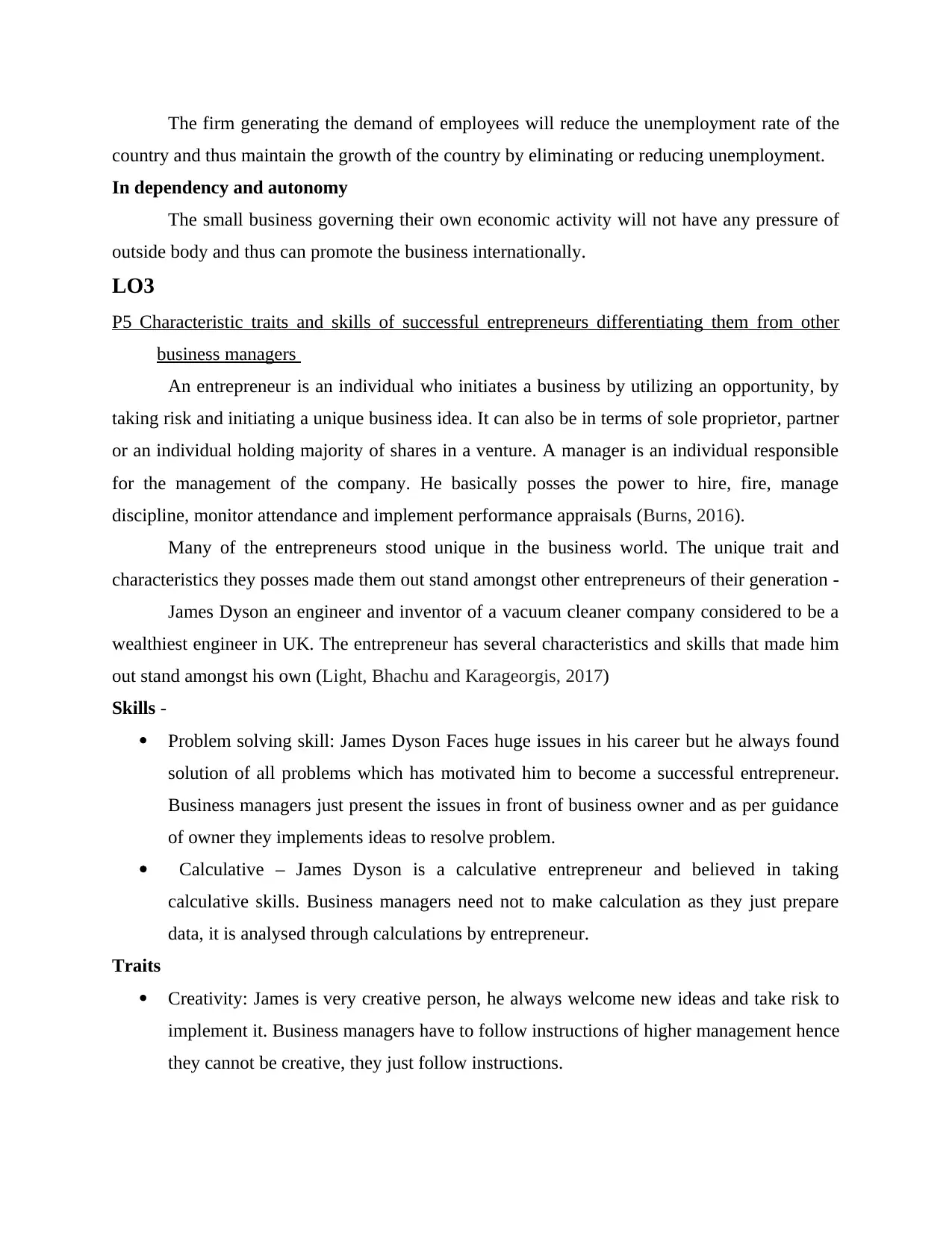
The firm generating the demand of employees will reduce the unemployment rate of the
country and thus maintain the growth of the country by eliminating or reducing unemployment.
In dependency and autonomy
The small business governing their own economic activity will not have any pressure of
outside body and thus can promote the business internationally.
LO3
P5 Characteristic traits and skills of successful entrepreneurs differentiating them from other
business managers
An entrepreneur is an individual who initiates a business by utilizing an opportunity, by
taking risk and initiating a unique business idea. It can also be in terms of sole proprietor, partner
or an individual holding majority of shares in a venture. A manager is an individual responsible
for the management of the company. He basically posses the power to hire, fire, manage
discipline, monitor attendance and implement performance appraisals (Burns, 2016).
Many of the entrepreneurs stood unique in the business world. The unique trait and
characteristics they posses made them out stand amongst other entrepreneurs of their generation -
James Dyson an engineer and inventor of a vacuum cleaner company considered to be a
wealthiest engineer in UK. The entrepreneur has several characteristics and skills that made him
out stand amongst his own (Light, Bhachu and Karageorgis, 2017)
Skills -
Problem solving skill: James Dyson Faces huge issues in his career but he always found
solution of all problems which has motivated him to become a successful entrepreneur.
Business managers just present the issues in front of business owner and as per guidance
of owner they implements ideas to resolve problem.
Calculative – James Dyson is a calculative entrepreneur and believed in taking
calculative skills. Business managers need not to make calculation as they just prepare
data, it is analysed through calculations by entrepreneur.
Traits
Creativity: James is very creative person, he always welcome new ideas and take risk to
implement it. Business managers have to follow instructions of higher management hence
they cannot be creative, they just follow instructions.
country and thus maintain the growth of the country by eliminating or reducing unemployment.
In dependency and autonomy
The small business governing their own economic activity will not have any pressure of
outside body and thus can promote the business internationally.
LO3
P5 Characteristic traits and skills of successful entrepreneurs differentiating them from other
business managers
An entrepreneur is an individual who initiates a business by utilizing an opportunity, by
taking risk and initiating a unique business idea. It can also be in terms of sole proprietor, partner
or an individual holding majority of shares in a venture. A manager is an individual responsible
for the management of the company. He basically posses the power to hire, fire, manage
discipline, monitor attendance and implement performance appraisals (Burns, 2016).
Many of the entrepreneurs stood unique in the business world. The unique trait and
characteristics they posses made them out stand amongst other entrepreneurs of their generation -
James Dyson an engineer and inventor of a vacuum cleaner company considered to be a
wealthiest engineer in UK. The entrepreneur has several characteristics and skills that made him
out stand amongst his own (Light, Bhachu and Karageorgis, 2017)
Skills -
Problem solving skill: James Dyson Faces huge issues in his career but he always found
solution of all problems which has motivated him to become a successful entrepreneur.
Business managers just present the issues in front of business owner and as per guidance
of owner they implements ideas to resolve problem.
Calculative – James Dyson is a calculative entrepreneur and believed in taking
calculative skills. Business managers need not to make calculation as they just prepare
data, it is analysed through calculations by entrepreneur.
Traits
Creativity: James is very creative person, he always welcome new ideas and take risk to
implement it. Business managers have to follow instructions of higher management hence
they cannot be creative, they just follow instructions.
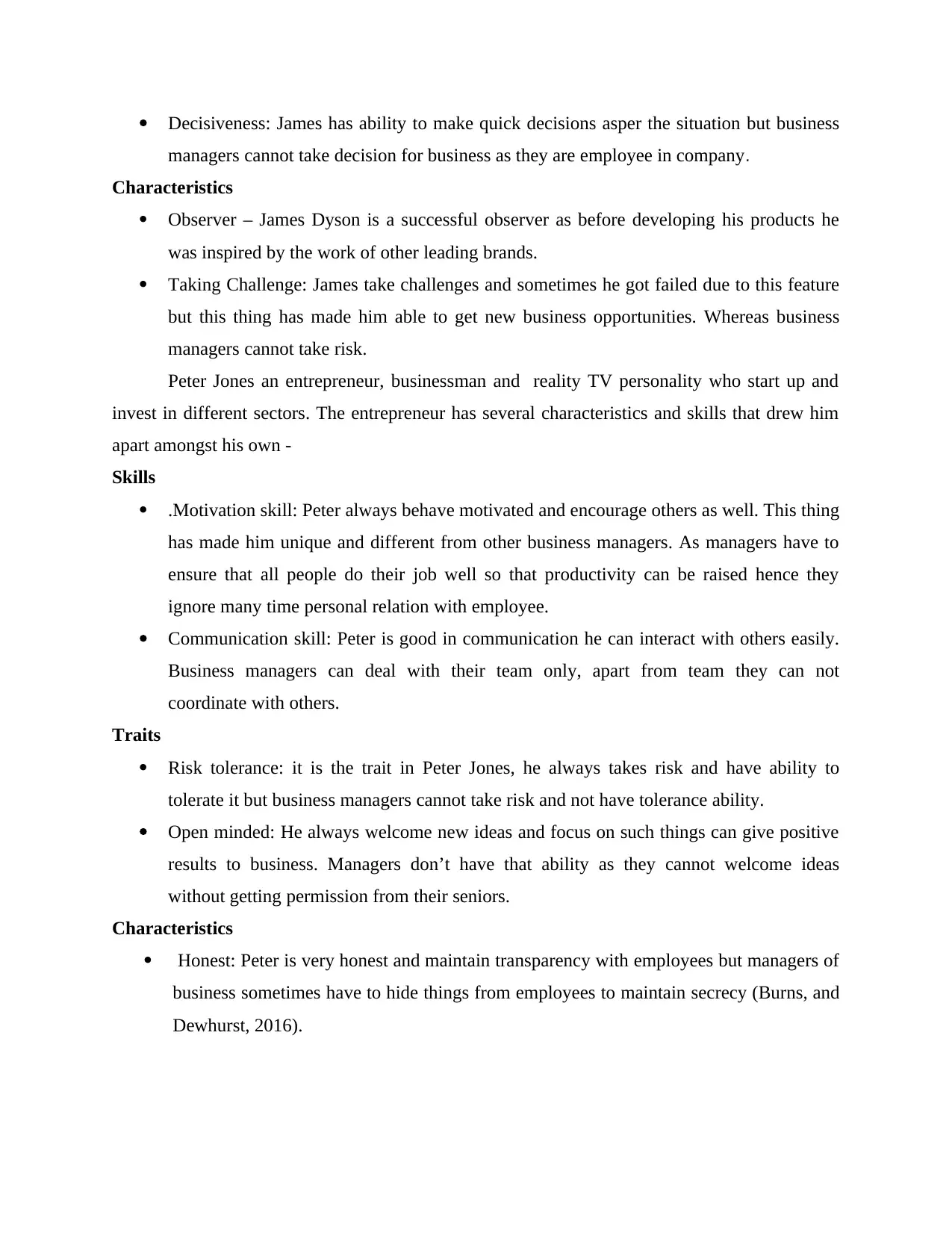
Decisiveness: James has ability to make quick decisions asper the situation but business
managers cannot take decision for business as they are employee in company.
Characteristics
Observer – James Dyson is a successful observer as before developing his products he
was inspired by the work of other leading brands.
Taking Challenge: James take challenges and sometimes he got failed due to this feature
but this thing has made him able to get new business opportunities. Whereas business
managers cannot take risk.
Peter Jones an entrepreneur, businessman and reality TV personality who start up and
invest in different sectors. The entrepreneur has several characteristics and skills that drew him
apart amongst his own -
Skills
.Motivation skill: Peter always behave motivated and encourage others as well. This thing
has made him unique and different from other business managers. As managers have to
ensure that all people do their job well so that productivity can be raised hence they
ignore many time personal relation with employee.
Communication skill: Peter is good in communication he can interact with others easily.
Business managers can deal with their team only, apart from team they can not
coordinate with others.
Traits
Risk tolerance: it is the trait in Peter Jones, he always takes risk and have ability to
tolerate it but business managers cannot take risk and not have tolerance ability.
Open minded: He always welcome new ideas and focus on such things can give positive
results to business. Managers don’t have that ability as they cannot welcome ideas
without getting permission from their seniors.
Characteristics
Honest: Peter is very honest and maintain transparency with employees but managers of
business sometimes have to hide things from employees to maintain secrecy (Burns, and
Dewhurst, 2016).
managers cannot take decision for business as they are employee in company.
Characteristics
Observer – James Dyson is a successful observer as before developing his products he
was inspired by the work of other leading brands.
Taking Challenge: James take challenges and sometimes he got failed due to this feature
but this thing has made him able to get new business opportunities. Whereas business
managers cannot take risk.
Peter Jones an entrepreneur, businessman and reality TV personality who start up and
invest in different sectors. The entrepreneur has several characteristics and skills that drew him
apart amongst his own -
Skills
.Motivation skill: Peter always behave motivated and encourage others as well. This thing
has made him unique and different from other business managers. As managers have to
ensure that all people do their job well so that productivity can be raised hence they
ignore many time personal relation with employee.
Communication skill: Peter is good in communication he can interact with others easily.
Business managers can deal with their team only, apart from team they can not
coordinate with others.
Traits
Risk tolerance: it is the trait in Peter Jones, he always takes risk and have ability to
tolerate it but business managers cannot take risk and not have tolerance ability.
Open minded: He always welcome new ideas and focus on such things can give positive
results to business. Managers don’t have that ability as they cannot welcome ideas
without getting permission from their seniors.
Characteristics
Honest: Peter is very honest and maintain transparency with employees but managers of
business sometimes have to hide things from employees to maintain secrecy (Burns, and
Dewhurst, 2016).
⊘ This is a preview!⊘
Do you want full access?
Subscribe today to unlock all pages.

Trusted by 1+ million students worldwide
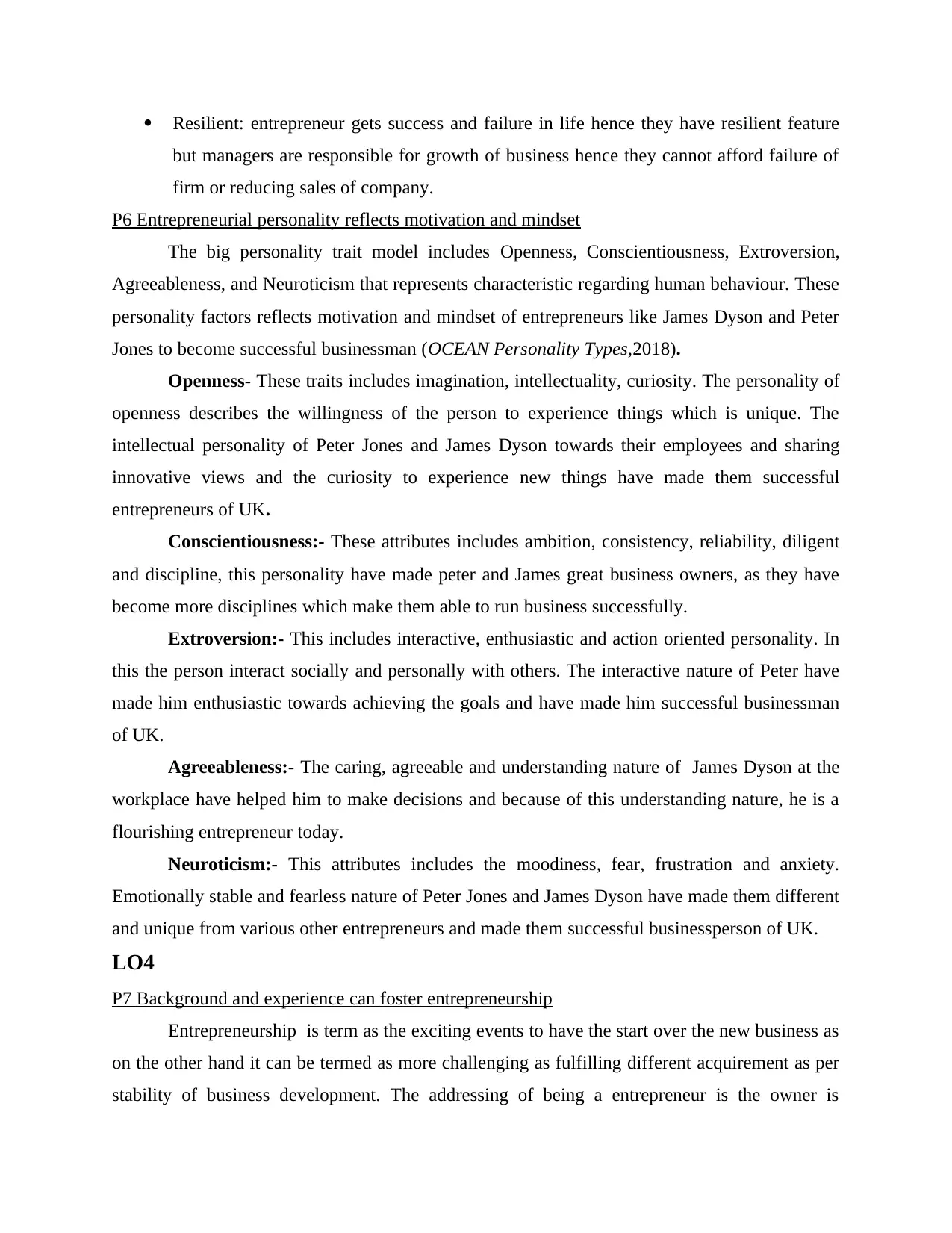
Resilient: entrepreneur gets success and failure in life hence they have resilient feature
but managers are responsible for growth of business hence they cannot afford failure of
firm or reducing sales of company.
P6 Entrepreneurial personality reflects motivation and mindset
The big personality trait model includes Openness, Conscientiousness, Extroversion,
Agreeableness, and Neuroticism that represents characteristic regarding human behaviour. These
personality factors reflects motivation and mindset of entrepreneurs like James Dyson and Peter
Jones to become successful businessman (OCEAN Personality Types,2018).
Openness- These traits includes imagination, intellectuality, curiosity. The personality of
openness describes the willingness of the person to experience things which is unique. The
intellectual personality of Peter Jones and James Dyson towards their employees and sharing
innovative views and the curiosity to experience new things have made them successful
entrepreneurs of UK.
Conscientiousness:- These attributes includes ambition, consistency, reliability, diligent
and discipline, this personality have made peter and James great business owners, as they have
become more disciplines which make them able to run business successfully.
Extroversion:- This includes interactive, enthusiastic and action oriented personality. In
this the person interact socially and personally with others. The interactive nature of Peter have
made him enthusiastic towards achieving the goals and have made him successful businessman
of UK.
Agreeableness:- The caring, agreeable and understanding nature of James Dyson at the
workplace have helped him to make decisions and because of this understanding nature, he is a
flourishing entrepreneur today.
Neuroticism:- This attributes includes the moodiness, fear, frustration and anxiety.
Emotionally stable and fearless nature of Peter Jones and James Dyson have made them different
and unique from various other entrepreneurs and made them successful businessperson of UK.
LO4
P7 Background and experience can foster entrepreneurship
Entrepreneurship is term as the exciting events to have the start over the new business as
on the other hand it can be termed as more challenging as fulfilling different acquirement as per
stability of business development. The addressing of being a entrepreneur is the owner is
but managers are responsible for growth of business hence they cannot afford failure of
firm or reducing sales of company.
P6 Entrepreneurial personality reflects motivation and mindset
The big personality trait model includes Openness, Conscientiousness, Extroversion,
Agreeableness, and Neuroticism that represents characteristic regarding human behaviour. These
personality factors reflects motivation and mindset of entrepreneurs like James Dyson and Peter
Jones to become successful businessman (OCEAN Personality Types,2018).
Openness- These traits includes imagination, intellectuality, curiosity. The personality of
openness describes the willingness of the person to experience things which is unique. The
intellectual personality of Peter Jones and James Dyson towards their employees and sharing
innovative views and the curiosity to experience new things have made them successful
entrepreneurs of UK.
Conscientiousness:- These attributes includes ambition, consistency, reliability, diligent
and discipline, this personality have made peter and James great business owners, as they have
become more disciplines which make them able to run business successfully.
Extroversion:- This includes interactive, enthusiastic and action oriented personality. In
this the person interact socially and personally with others. The interactive nature of Peter have
made him enthusiastic towards achieving the goals and have made him successful businessman
of UK.
Agreeableness:- The caring, agreeable and understanding nature of James Dyson at the
workplace have helped him to make decisions and because of this understanding nature, he is a
flourishing entrepreneur today.
Neuroticism:- This attributes includes the moodiness, fear, frustration and anxiety.
Emotionally stable and fearless nature of Peter Jones and James Dyson have made them different
and unique from various other entrepreneurs and made them successful businessperson of UK.
LO4
P7 Background and experience can foster entrepreneurship
Entrepreneurship is term as the exciting events to have the start over the new business as
on the other hand it can be termed as more challenging as fulfilling different acquirement as per
stability of business development. The addressing of being a entrepreneur is the owner is
Paraphrase This Document
Need a fresh take? Get an instant paraphrase of this document with our AI Paraphraser
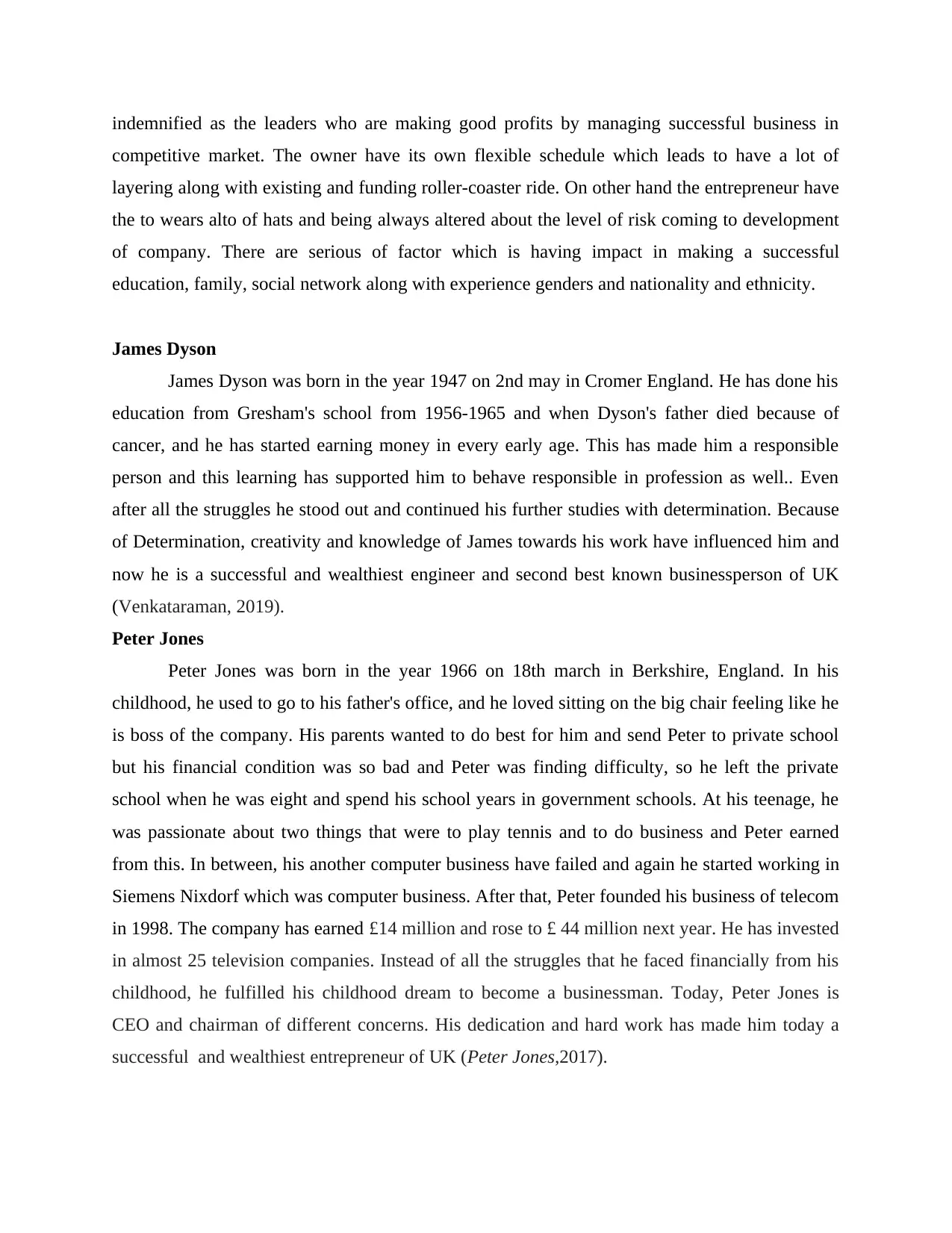
indemnified as the leaders who are making good profits by managing successful business in
competitive market. The owner have its own flexible schedule which leads to have a lot of
layering along with existing and funding roller-coaster ride. On other hand the entrepreneur have
the to wears alto of hats and being always altered about the level of risk coming to development
of company. There are serious of factor which is having impact in making a successful
education, family, social network along with experience genders and nationality and ethnicity.
James Dyson
James Dyson was born in the year 1947 on 2nd may in Cromer England. He has done his
education from Gresham's school from 1956-1965 and when Dyson's father died because of
cancer, and he has started earning money in every early age. This has made him a responsible
person and this learning has supported him to behave responsible in profession as well.. Even
after all the struggles he stood out and continued his further studies with determination. Because
of Determination, creativity and knowledge of James towards his work have influenced him and
now he is a successful and wealthiest engineer and second best known businessperson of UK
(Venkataraman, 2019).
Peter Jones
Peter Jones was born in the year 1966 on 18th march in Berkshire, England. In his
childhood, he used to go to his father's office, and he loved sitting on the big chair feeling like he
is boss of the company. His parents wanted to do best for him and send Peter to private school
but his financial condition was so bad and Peter was finding difficulty, so he left the private
school when he was eight and spend his school years in government schools. At his teenage, he
was passionate about two things that were to play tennis and to do business and Peter earned
from this. In between, his another computer business have failed and again he started working in
Siemens Nixdorf which was computer business. After that, Peter founded his business of telecom
in 1998. The company has earned £14 million and rose to £ 44 million next year. He has invested
in almost 25 television companies. Instead of all the struggles that he faced financially from his
childhood, he fulfilled his childhood dream to become a businessman. Today, Peter Jones is
CEO and chairman of different concerns. His dedication and hard work has made him today a
successful and wealthiest entrepreneur of UK (Peter Jones,2017).
competitive market. The owner have its own flexible schedule which leads to have a lot of
layering along with existing and funding roller-coaster ride. On other hand the entrepreneur have
the to wears alto of hats and being always altered about the level of risk coming to development
of company. There are serious of factor which is having impact in making a successful
education, family, social network along with experience genders and nationality and ethnicity.
James Dyson
James Dyson was born in the year 1947 on 2nd may in Cromer England. He has done his
education from Gresham's school from 1956-1965 and when Dyson's father died because of
cancer, and he has started earning money in every early age. This has made him a responsible
person and this learning has supported him to behave responsible in profession as well.. Even
after all the struggles he stood out and continued his further studies with determination. Because
of Determination, creativity and knowledge of James towards his work have influenced him and
now he is a successful and wealthiest engineer and second best known businessperson of UK
(Venkataraman, 2019).
Peter Jones
Peter Jones was born in the year 1966 on 18th march in Berkshire, England. In his
childhood, he used to go to his father's office, and he loved sitting on the big chair feeling like he
is boss of the company. His parents wanted to do best for him and send Peter to private school
but his financial condition was so bad and Peter was finding difficulty, so he left the private
school when he was eight and spend his school years in government schools. At his teenage, he
was passionate about two things that were to play tennis and to do business and Peter earned
from this. In between, his another computer business have failed and again he started working in
Siemens Nixdorf which was computer business. After that, Peter founded his business of telecom
in 1998. The company has earned £14 million and rose to £ 44 million next year. He has invested
in almost 25 television companies. Instead of all the struggles that he faced financially from his
childhood, he fulfilled his childhood dream to become a businessman. Today, Peter Jones is
CEO and chairman of different concerns. His dedication and hard work has made him today a
successful and wealthiest entrepreneur of UK (Peter Jones,2017).
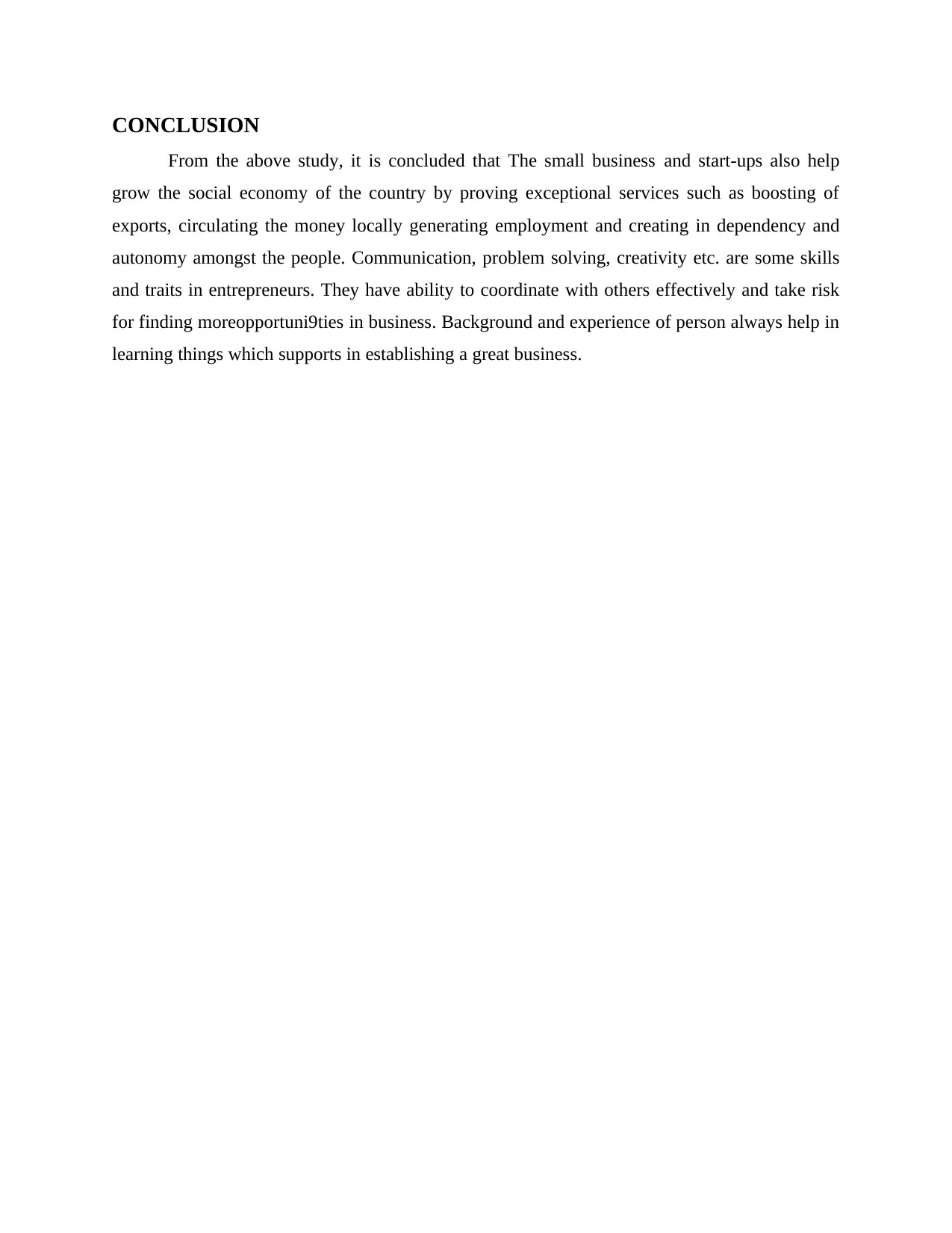
CONCLUSION
From the above study, it is concluded that The small business and start-ups also help
grow the social economy of the country by proving exceptional services such as boosting of
exports, circulating the money locally generating employment and creating in dependency and
autonomy amongst the people. Communication, problem solving, creativity etc. are some skills
and traits in entrepreneurs. They have ability to coordinate with others effectively and take risk
for finding moreopportuni9ties in business. Background and experience of person always help in
learning things which supports in establishing a great business.
From the above study, it is concluded that The small business and start-ups also help
grow the social economy of the country by proving exceptional services such as boosting of
exports, circulating the money locally generating employment and creating in dependency and
autonomy amongst the people. Communication, problem solving, creativity etc. are some skills
and traits in entrepreneurs. They have ability to coordinate with others effectively and take risk
for finding moreopportuni9ties in business. Background and experience of person always help in
learning things which supports in establishing a great business.
⊘ This is a preview!⊘
Do you want full access?
Subscribe today to unlock all pages.

Trusted by 1+ million students worldwide
1 out of 13
Related Documents
Your All-in-One AI-Powered Toolkit for Academic Success.
+13062052269
info@desklib.com
Available 24*7 on WhatsApp / Email
![[object Object]](/_next/static/media/star-bottom.7253800d.svg)
Unlock your academic potential
Copyright © 2020–2026 A2Z Services. All Rights Reserved. Developed and managed by ZUCOL.




